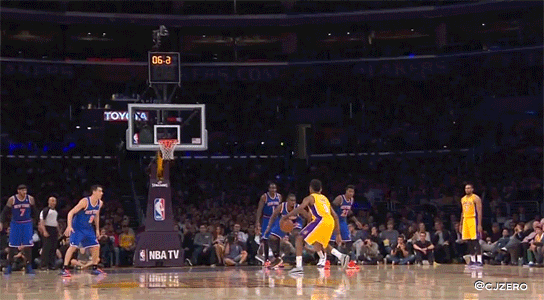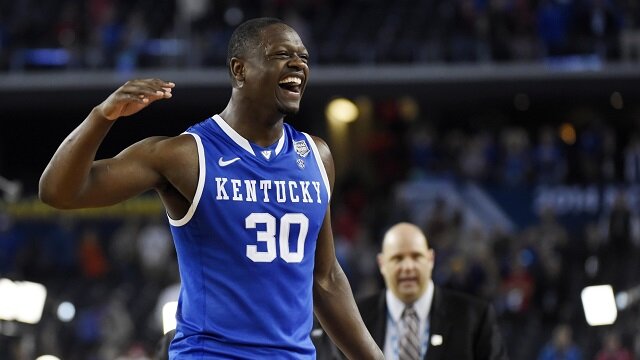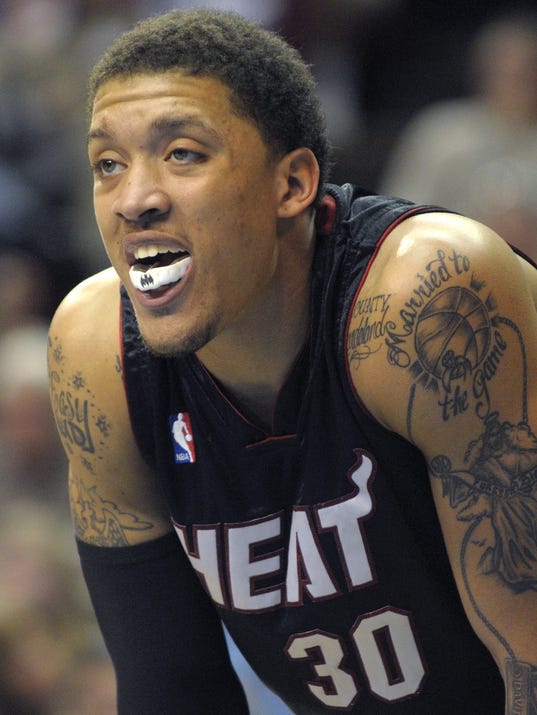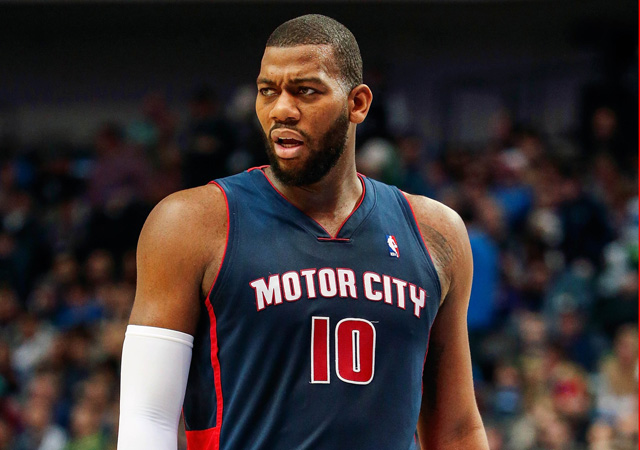 Note: All grades are handed out according to preseason expectations vs. actual production.
Note: All grades are handed out according to preseason expectations vs. actual production. Small Forward: Nick Young
17.9 PPG, 1.5 APG, 2.6 RPG, 2.5 WS, .067 WS/48 on 43.5% shooting and 38.6% shooting from deep. Grade: (B-)
At first, I didn't really know how to grade Nick Young, as I seem to remember him being better than he actually was. This was probably because the rest of the team was so terrible and I had such little expectations for the majority of the players involved (which is why a handful of players got a fairly high grade) that Swaggy P seemed better than he was.
The B- seems unfair to him because his production was better than a guy like Kendall Marshall, for example, but Young's preseason expectations were met and not really much else. His stats seem like they should net him at least a B, but most of those career bests are simply him playing more minutes. His shooting percentage was only slightly better than his career average and his defense remained non-existent, save for that game winning charge he took against the Pistons early in the season that earned him the nickname Swaggy D, if only for a few weeks. His high scoring was attributed to him taking more shots; he had the highest Per 36 average of shots taken for his career at 17.7. This isn't to say that he wasn't good, he had stretches where he was by far the best Laker player on the court, but those were quickly cancelled out with some very cold stretches as well. The one thing that really earned Young a B- and not a C+ was that he had a career high PER of 16, which was the highest among qualifying perimeter players on the Lakers.
Overall, Swaggy P did his job, which is to score, sometimes in the most infuriating way possible with contested, 20 foot jump shots early in the shot clock. Nonetheless, Swaggy gets a bit of an upgrade in his final grade because he was simply entertaining as hell.
 |
| Never change, Swaggy P. |
Small Forward: Wesley Johnson
9.1 PPG, 1.6 APG, 4.4 RPG, 1.9 WS, .041 WS/48 on 42.5% shooting and 36.9% shooting from deep. Grade: (C+)
It's always hard to see such a highly touted prospect, like Johnson once was, completely flame out in such a fashion that he's taking league minimum contracts at age 25. Johnson was a low risk, potentially high reward signing last season. We didn't see much of the reward part, at least not on offense, because Johnson was exactly like Nick Young with his offensive production. Most of it was simply because of an increase in playing time. Unlike Young, he didn't see a big increase in Per 36 minute numbers one would normally see with a guy who saw a big increase in minutes from one year to another. It all just kind of stays the same, save for a few categories because of Mike D'Antoni's insistence on using Johnson as a power forward.
Johnson provided a major upgrade in the athleticism department and really came into his own as the corner three point shooting defensive specialist that the Lakers had him as last year. Johnson could barely create his own offense, relying mostly on late rotations and his athleticism to force himself to the rim, as well as fast breaks. He was basically your typical three point shooting, defensive specialist, except he didn't know his own limits offensively and his defense isn't good enough to make up for it, like it is with a guy like Bruce Bowen. Johnson was a solid enough player to have in the rotation, and was a pretty good defensive player but I expected at least marginal improvement offensively from the freakishly athletic 25 year old. As it is, his decision making hampered his grade, though I'm hopeful for some improvement from him with the addition of Byron Scott.
 |
| This really shouldn't even be possible |
10 PPG, 1.2 APG, 2.7 RPG, 0.3 WS, .017 WS/48 on 41.7% shooting and 34.6% shooting from deep. Grade: (B-)
X-Man was had quite a few highlights last year, as well as a bunch of blunders that he hopes we could forget. He was another high draft choice that didn't pan out and the Lakers got the 22 year old from Belgium on a cheap, league minimum contract because, why not? It was a great signing at the time, and it's still a good signing, considering the production he had compared to the money he was getting. Henry was a nice part of the bench's offensive production, as his slashing ability was truly something to behold at times, sometimes reaching the paint despite team's basically gearing their defense for it.
Penetrating the defense wasn't a problem for Xavier, the problem came immediately after, as he would sometimes put up some major clunkers in heavy traffic, or simply turn the ball over. It's the major reason his shooting percentage is as low as it is, despite getting to the rim so often. It's also why he averaged more turnovers than assists this year. Poor decision making is not something you want to see out of a guy that was your starting point guard at one time because of injuries and Pringles. And then, in typical Lakers fashion, Henry himself succumbed to injury and missed half of the season. If not for injury, his grade may have been a tad bit higher. I'm hopeful Henry can develop even further; he's still a very young 23 years old and he did manage to develop an outside shot last season. He was a fun player to watch and his athleticism made things exciting on the offensive end of the ball. Hopefully, he can stay on the court next year.
 |
| Bah Gawd! He's killed him! |
Small Forward: Shawne Williams
5.6 PPG, 0.8 APG, 4.6 RPG, 0.7 WS, .045 WS/48 on 38% shooting and 32.6% shooting from deep. Grade: (F)
There was nothing more frustrating last year than watching Mke D'Antoni continue to give Shawne Williams minutes at both power forward and small forward, despite the fact that he can't really shoot, or pass the ball or dribble the ball and his best quality, his defense, isn't anything eye popping either. And he gave him 20.9 minutes per game, which is still somehow more than what Jordan Hill got last season because Pringles.
I understand we didn't have the depth last year to flat out not play anybody, but playing three centers at the same time would have been about equally as useful as Williams was in the rotation last year. He was as inefficient as they come, yet he kept on taking shots as if he was a shooter who was merely on a cold streak. When the defense leaves you all alone and it still takes you 5.3 shots per game to get to 5.6 points per game, you need to stop. Immediately. If he could have gotten anything worse than an F, he would have if not for his okay defense and the fact that he was no longer on my TV after February. Good riddance.
Power Forward: Ryan Kelly
8.0 PPG, 1.6 APG, 3.7 RPG, 2.2 WS, .081 WS/48 on 42.3% shooting and 33.8% shooting from deep. Grade: (B-)
I bet not a lot of Lakers fans knew who Ryan Kelly was before the Lakers took him in the 2nd round of last year's NBA draft. Kelly didn't see any regular playing time until after the Christmas day game against the Miami Heat. What we saw was a surprisingly solid power forward who could stretch the floor well enough but wasn't a massive liability defensively, and helped provide some semblance of size (something the 6'7'' Wesley Johnson never could, despite the athleticism).
I don't think anybody expected anything out of Kelly, so his B- is inflated simply on the fact that he was a second rounder with no expectations whatsoever. He was still a solid part of the rotation and could be a nice piece to have going forward with his three point shooting ability from the four slot. You can't really ask for much more out of a second round rookie.
Power Forward: Jordan Hill
9.7 PPG, 0.8 APG, 7.4 RPG, 4.4 WS, .141 WS/48 on 54.9% shooting and 68.5% from the free throw line. Grade: (A-)
There is not enough praise that I can give to Jordan Hill. I spent most of the season praising him and asking myself why Mike D'Antoni refused to play him more than 20 minutes per game, especially considering that Hill was tied with Pau Gasol as the team leaders in PER (19.3), he is easily the leader on the team in WS/48 with .141. The second highest WS/48 on the team is Jodie Meeks' .084, which is also under the league average of .100. The only reason Hill is second on the team in total Win Shares is because he only plays 20 minutes a game, which is just a shame. I would have loved to see how many Win Shares Hill could have been worth if he played 30+ minutes a game.
I'm hoping Hill and Scott don't have the same relationship that Hill and D'Antoni had all through his career because that would mean more frustration for Lakers fans who want to put out the best possible team. I'm not saying he should get immediate starter minutes (though he might be our starting center next year), I'm only asking for more than 27 minutes a game for him, because his production is too good to continue to ignore. Hill isn't without weaknesses, however, as he can't consistently create his own offense, but that didn't really matter, as nobody would have confused Hill for a guy like Dwight Howard or DeMarcus Cousins. Hill can clean the glass like no other, and most of his points come off of offensive rebounds and easy baskets around the rim. His main problem last season was foul trouble, as he would have averaged 4.1 fouls per 36 minutes.
Hill's Per 36 minute numbers were outstanding, as he would have had a slash line of 16.7 points per game, 12.8 rebounds per game and 1.3 assists per game. Those 12.8 rebounds would have been third in the league, ahead of Kevin Love, Dwight Howard and DeMarcus Cousins. Clearly, Hill should have gotten more minutes, and one of the reasons I'm excited about Byron Scott is the possibility of Hill getting starter minutes in the rotation.
Center: Pau Gasol
17.4 PPG, 3.4 APG, 9.7 RPG, 3.0 WS, .076 WS/48 on 48% shooting and 28.6% shooting from deep. Grade: (C+)
I kind of feel bad for how much scrutiny Pau Gasol was under in his final few seasons in Los Angeles. Here's a guy who was one of the league's top offensive options at power forward, and left it all on the court, just to have fans clamor for management to trade him. I can definitely see why he chose to leave. Gasol wasn't exactly himself last year, relative to other seasons. He put up some solid numbers; 17.4 points per game and 9.7 rebounds per game is very, very good. He remains one of the best passing big men in the league today (Side note: the pairing of Gasol and Joakim Noah should be lots of fun). Gasol's problem may have very well been a product of D'Antoni, because the team still played primarily through the perimeter, despite the fact that Pau was easily the team's best available player.
Pau was never really put into the best position to succeed, and it showed in his efficiency; this was the only year as a part of the Lakers, that Pau had a PER of under 20 (not counting last year, for obvious reasons). Gasol also had a WS/48 of under .100 for the first time in his 14 year career. Gasol was still a pretty good, productive player. Unfortunately for his grade, I sincerely thought he was going to be at least a little bit better. Either way, thank you Pau. You will forever be a Laker great.
Center: Chris Kaman
10.4 PPG, 1.5 APG, 5.9 RPG, 0.5 WS, .036 WS/48 on 50.9% shooting and 76.5% from the free throw line. Grade: (F)
I'm sad and disappointed that Chris Kaman didn't really work out with the team. Whether that was a product of Pringles or not is up to you, but he never really got it going when he did play. He was a solid, if unspectacular player on offense, but his defense this year was a bit painful to watch, as he was frequently slow on his rotations and sometimes even got beat on the glass by much smaller players. Kaman spent most of his time playing garbage minutes and laying down on the bench. So much time, in fact, that I can't think of a single memorable moment for him, save for the bench moment. When the best thing you did in a whole season was lay down on the bench because the team barely had enough players to use, it's safe to say you didn't have a good year.
 |
| This will always be hilarious. |
Center Robert Sacre.
5.4 PPG, 0.8 APG, 3.9 RPG, 1.4 WS, .061 WS/48 on 47.7% shooting and 68.1% from the free throw line. Grade: (C+)
Last year, I had 0 hopes for Robert Sacre. He was drafted in the second round after his four years at Gonzaga. Really, the only thing he had going for him was his size, as he was a true 7 footer. He had a pretty surprising season last year. He wasn't good, by any definition, but he was definitely a guy who could come in and play 10 minutes a game to give your center a breather. And, you know what? Sacre continues to be surprisingly competent. Aside from his amazing cheer leading abilities from the bench, Sacre provides legitimate value as a back up center, with solid passing skills and a nice jump shot from 15 feet out. He's not adept at scoring (that 47.7% shooting is not good at all for a big man), but he will work hard for your team night in and night out. You can't really ask for much more out of a second round pick. The past two seasons, the Lakers have made the most out of their 2nd round picks, which gives me hope for Jordan Clarkson, whom the Lakers picked in the 2nd round during this years' NBA draft.
All in all, it was a pretty bad season. We had a lot of very unproven talent that produced way beyond what we could have reasonably expected, which attributed to guys who got such high grades, despite the team finishing with a 27-55 record.










